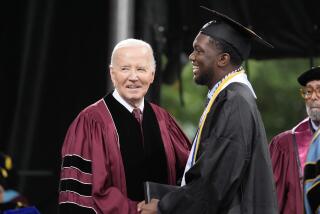Gore Shares Views of Civil Rights Gains With Students
- Share via
ATLANTA — When speaking to school audiences, Vice President Al Gore often talks about the role World War II veterans played in the dramatic expansion of the nation’s schools to accommodate the baby boom generation. Before African American audiences, he talks about civil rights and his support for affirmative action.
On Friday, speaking to high school students, virtually all of them black, he combined the two subjects--and came up with an oft-overlooked, if perhaps exaggerated in his account, element in the history of the civil rights movement: It was begun, he said, by World War II veterans dissatisfied with what they found in the United States when they returned from overseas deployment in 1945.
“The veterans of World War II who saved the world came back to this country and saw the things that needed to be changed here, and that’s why they started the civil rights revolution,” the vice president said in a speech on the nation’s education needs.
Although President Truman’s order desegregating the nation’s armed forces played an important role in promoting the integration of American society, the leaders at the front of the civil rights movement in the 1950s and 1960s were generally considered to be members of a generation that came of age after the war.
However, it was the experience of working with whites during deployments overseas that inspired African American veterans, upon their return to the United States, to become more outspoken in criticizing the Jim Crow laws of the South while leaders pointed to the patriotism they had displayed and drew contrasts with their treatment at home.
Gore’s campaign is in the midst of an energized push to lock up the support of African American Democrats, first in New York and California, which vote in the round of primaries and caucuses Tuesday, and then in a swath of Southern states that hold elections a week later.
Although the Rev. Jesse Jackson offered a sudden announcement Wednesday in Los Angeles, as Gore and Bill Bradley were about to debate, that he was endorsing the vice president, he is making a second such announcement--and one the campaign hopes will generate more attention--at Jackson’s Operation PUSH (People United to Serve Humanity) headquarters in Chicago today.
During a television interview in Atlanta, Gore was asked whether Gov. George W. Bush should be forgiven for visiting Bob Jones University, which prohibits interracial dating, as John Rocker of the Atlanta Braves has been by some for making racist and anti-gay remarks.
A young person, such as Rocker, can reach out and learn from a mistake, Gore said, and “somebody in Gov. Bush’s position can do the same thing.
“But I think that someone aspiring to national leadership has to meet a somewhat higher standard. The short answer to your question is, sure, people who are running for office, who hold office, can learn from mistakes and can transcend them.”
Gore, as has been increasingly his pattern, paid no heed to Bradley, his Democratic opponent.
The former senator from New Jersey was in Providence, R.I., presenting a lengthy foreign policy platform to a packed room of Brown University students. It capped a day in which he tried to shore up support in New England, his last best chance for a good showing in Tuesday’s primaries.
Calling for a broader engagement with Russia, China, Japan and Europe, Bradley said the next American president has a unique opportunity to foster peace and prosperity.
“We are at a special moment in time, a moment that requires leadership with a unifying vision of the future,” Bradley said. “It is not a vision of more of the same or of being a custodian of the status quo. It is a vision that will take advantage of the opportunities and challenges of globalization to shape a more peaceful and prosperous world.”
Gerstenzang reported from Atlanta and Gold from Rhode Island.
More to Read
Get the L.A. Times Politics newsletter
Deeply reported insights into legislation, politics and policy from Sacramento, Washington and beyond. In your inbox twice per week.
You may occasionally receive promotional content from the Los Angeles Times.










